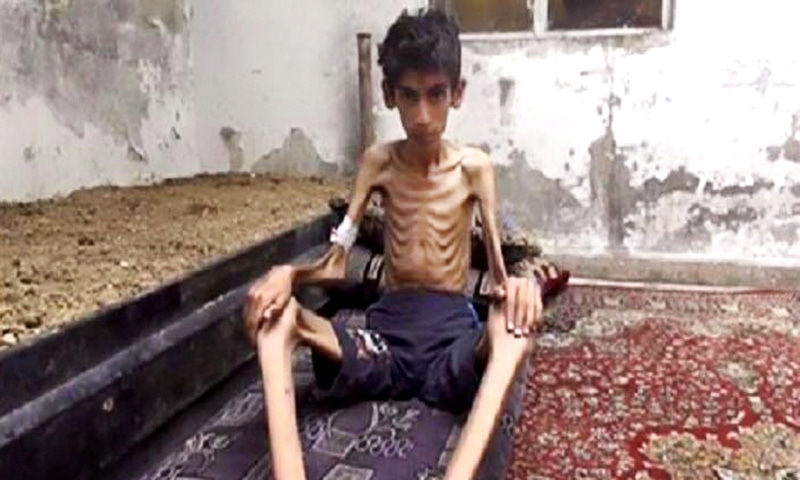Residents of Syrian town say they’re surviving on leaves and grass

Families are eating leaves, grass and water flavoured with spices in the Syrian town of Madaya, where rice is sold by the gram because a kilogram costs as much as $250. Some have killed and eaten their pets.
“People are dying in slow motion,” said Louay, a social worker from the town told the Guardian in a phone interview, his voice weakened by months of abject hunger. “We had some flowers growing in pots at home. Yesterday, we picked the petals and ate them, but they were bitter, awful.”
He sent pictures of emaciated bodies of several elderly men, recent casualties of the starvation. He had not taken the pictures himself, but said the men were well known in the town.
“We used to say nobody could ever die from hunger, but we have seen people actually die of hunger.”

Other activists inside the town also shared pictures of starving children, one being pushed in a buggy far too small for him because he is too weak to walk.
Others who can still move around, and should normally be in school, are risking their lives trying to collect plants in minefields around the town edges, and several have lost limbs, residents said.
It was not possible to verify their claims because of the siege, but several independent accounts were consistent in describing life in a town short on food, medicine and electricity.
“Whether you are a man, woman, child, whether you’re 70 or 20 years old, you will have lost about 15kg of your weight,” said Ebrahem Abbass, a defector who had served as a sergeant in the Syrian army. “You don’t see a child whose eyes aren’t sunken and staring from hunger.”
Up to 30,000 people have been trapped in Madaya since July, under a tight siege by pro-government forces. They say they are being treated as pawns in a complicated power play, punished for the suffering of two villages hundreds of miles away at the hand of anti-government troops.
In the spring of last year, a rebel coalition known as Jaysh al Fateh captured large swathes of north-western Syria from the Assad regime, surrounding two Shia enclaves in Idlib province called Fua and Kefraya, whose residents are also enduring a debilitating siege.
The government forces are now starving Madaya and neighbouring Zabadani, once a stronghold of the opposition, after a punishing six-month campaign. Under a ceasefire deal, foreign backers of the government and the opposition are attempting to orchestrate a population swap, essentially a peaceful sectarian cleansing.
So far they have only managed to agree an evacuation of wounded individuals on both sides and safe passage for a single aid delivery in October.
That allowed convoys to reach Madaya, Zabadani, Fua and Kefraya simultaneously, but supplies only lasted a few days, residents say.
“I swear by God, and you might not believe me because it sounds fantastical, I tried to buy some food today, but a kilo of rice is 100,000 [Syrian] pounds,” said Louay.
At the black market exchange rate that would be close to $250.
“I’ve personally seen people slaughtering cats to eat them, and even the trees have been stripped of leaves now,” he added.
People are so weak that they often faint, and hunger is made worse by the biting cold in an area around 1,300 metres above sea level, near the border with Lebanon.
By arrangement with The Guardian
Published in Dawn, January 8th, 2016













































